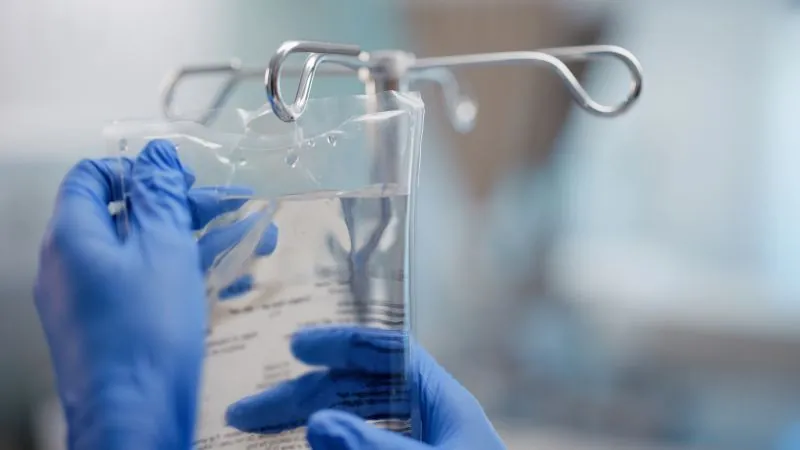
Crisis Unveiled: Biden's Wartime Powers Activated to Combat IV Fluid Shortages Amid Hurricane Havoc!
2024-10-16
Author: Ming
Introduction
In a dramatic escalation of efforts to rectify critical intravenous (IV) fluid shortages in the United States, the Biden administration has activated the wartime powers of the Defense Production Act. This decisive action comes on the heels of devastating disruptions caused by Hurricane Helene, which wreaked havoc on production capabilities at Baxter International’s North Cove facility—America's largest producer of IV fluids and dialysis solutions.
Impact of Hurricane Helene
As Hurricane Helene swept across western North Carolina last month, it severely hampered operations at Baxter’s plant, resulting in a halt to production. While the company has resumed distribution, it is still constrained, allowing orders to reach only 60% of the standard volume for high-demand IV fluids.
Consequences for Healthcare
The ramifications are severe: The U.S. Food and Drug Administration (FDA) has acknowledged multiple shortages that have forced hospitals to ration supplies and postpone surgeries, placing a tremendous strain on patient care. The situation has become so dire that the CDC issued a health advisory urging healthcare providers to adapt to the ongoing supply disruptions.
Government Response
To further address this crisis, last week the FDA announced new measures, including permitting the importation of essential products from five overseas facilities. Simultaneously, U.S. manufacturers like B Braun Medical and ICU Medical are ramping up production to fill the widening gaps in the supply chain.
Baxter's Role and Defense Production Act
Baxter’s North Cove facility is central to this crisis, typically supplying around 60% of the nation’s IV fluids. The intervention by the Department of Health and Human Services (HHS) through the Defense Production Act is aimed at providing Baxter with priority access to crucial materials needed for recovery and enhanced production capabilities.
Urgent Measures from HHS
An official from HHS emphasized the urgency of the situation: “Ensuring access to vital medical supplies is a top priority for the Administration. We are collaborating closely with Baxter to expedite the cleanup and restoration of their site, including utilizing the Defense Production Act to facilitate a swift production restart.”
Historical Context of the Defense Production Act
Originally enacted in 1950 during the Korean War, the Defense Production Act empowers the government to mobilize resources for industrial production during emergencies. It has previously been leveraged during the COVID-19 pandemic by both the Biden and Trump administrations to enhance manufacturing of critical medical supplies like vaccines and ventilators. The act was also instrumental in recovery efforts following Hurricane Maria in Puerto Rico in 2017, which similarly devastated Baxter's facilities and led to months-long shortages of vital IV bags.
Progress and Outlook
Fast forward to the current crisis: Baxter is reporting promising progress on the cleanup and remediation of its North Carolina plant, having implemented temporary solutions like rock bridges to facilitate logistics and transportation of products and equipment. Management is prioritizing comprehensive cleaning efforts and evaluating the status of production lines.
Future Projections
The company aims to resume production at the site by the end of the year, albeit in phases, without a precise timeline for when full production levels will be restored. Meanwhile, allocations for IV solutions in children’s hospitals have returned to full capacity, and some IV product lines are expected to achieve full allocation by year’s end.
Conclusion
As the aftermath of Hurricane Helene continues to ripple through the supply chain, the unfolding crisis serves as a stark reminder of the vulnerabilities within the U.S. healthcare infrastructure, urging swift and robust responses to prevent a future catastrophe!




 Brasil (PT)
Brasil (PT)
 Canada (EN)
Canada (EN)
 Chile (ES)
Chile (ES)
 España (ES)
España (ES)
 France (FR)
France (FR)
 Hong Kong (EN)
Hong Kong (EN)
 Italia (IT)
Italia (IT)
 日本 (JA)
日本 (JA)
 Magyarország (HU)
Magyarország (HU)
 Norge (NO)
Norge (NO)
 Polska (PL)
Polska (PL)
 Schweiz (DE)
Schweiz (DE)
 Singapore (EN)
Singapore (EN)
 Sverige (SV)
Sverige (SV)
 Suomi (FI)
Suomi (FI)
 Türkiye (TR)
Türkiye (TR)